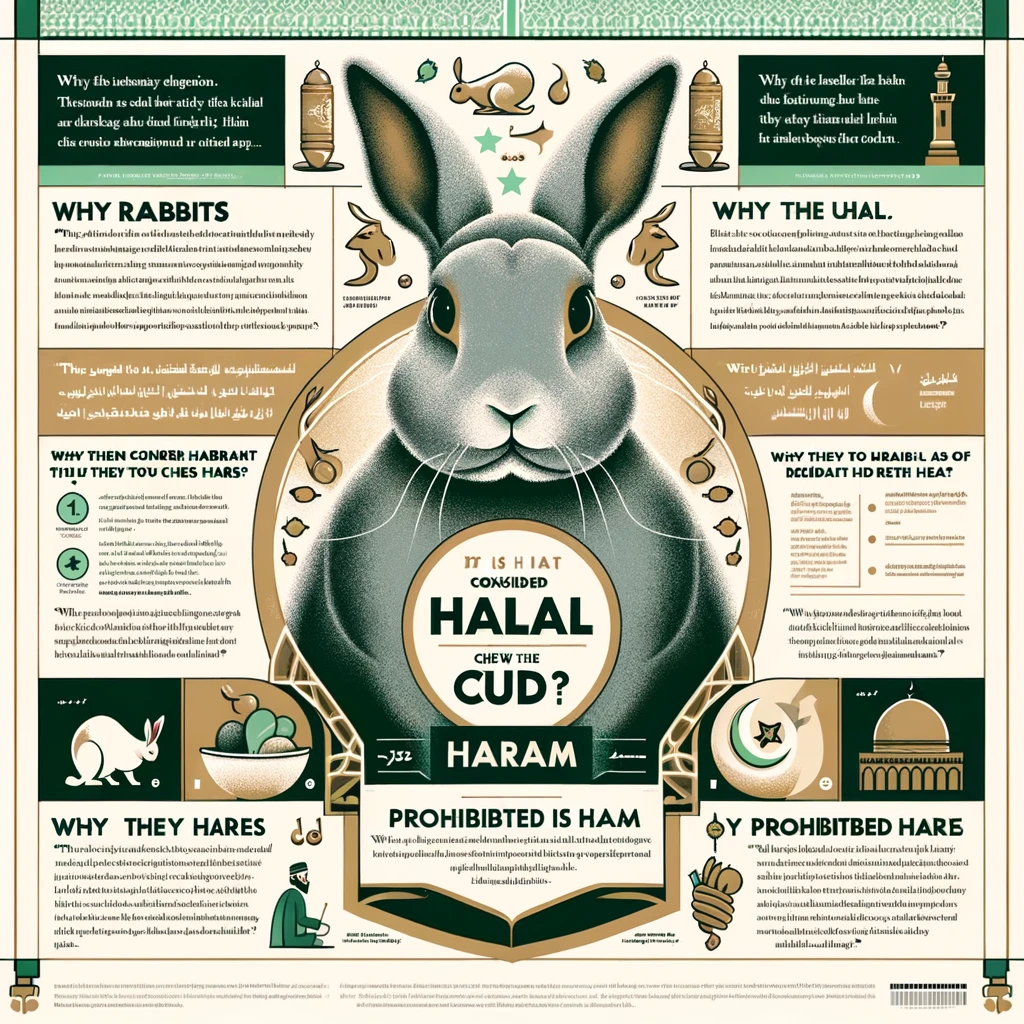Are Rabbits Halal?
Overview of Halal Food Regulations
Halal refers to practices that are permissible under Islamic law. When it comes to food, for meat to be considered halal, it must meet certain requirements:
Key requirements for halal meat:
- The animal must be slaughtered according to zabiha, meaning it is killed quickly by cutting the throat and draining the blood
- Certain verses of the Quran must be recited over the animal while it is killed
- The animal must be slaughtered in the name of Allah
These requirements around ritual slaughter ensure the meat is halal. However, there are also restrictions around which animals are allowed to be eaten in the first place.
Animals prohibited under Islamic law include:
- Pigs/pork products
- Carnivorous animals
- Animals not slaughtered properly
Herbivores and omnivores like cattle, goats, sheep, fish, and chickens are generally considered halal if they meet the ritual slaughter requirements. Beyond this basic framework, whether a specific animal is halal depends on interpretation of Islamic law.
The debate around the halal status of rabbits stems from differences in scholarly opinion, which I’ll analyze in depth next.
Are Rabbits Considered Halal or Haram Animals?
The halal status of rabbits is controversial among Islamic scholars. There are mixed opinions on whether rabbits count as halal or haram (forbidden) to eat in Islam.
Here is an overview of the evidence on both sides of the debate:
| Reasons Why Rabbits Are Considered Halal | Reasons Why Rabbits Are Considered Haram |
|---|---|
| Rabbits chew their cud, which is an attribute of halal animals according to some interpretations of the Quran/Hadith | There is no definitive evidence from the Quran or Hadith explicitly allowing rabbits |
| Rabbits were traditionally eaten in the Arabian peninsula where Islam originated | Rabbits resemble hares, which are prohibited in some Hadith |
| Most standards consider rabbit meat halal, including JAKIM in Malaysia | Rabbits are not specifically named as permitted animals in the Quran |
As we can see, there are good arguments on both sides. Next we’ll analyze each perspective in more detail.
Evidence that Rabbits Are Halal

There are several arguments put forth by Islamic experts defending the halal status of rabbits:
1. Rabbits chew their cud
In the Quran, Allah names animals that are halal for consumption. These are animals that meet certain traits, including cattle that chew their cud:
{And cattle He has created for you; from them ye derive warmth, and numerous benefits, and of their meat ye eat. And you have a sense of pride and beauty in them as you drive them home in the evening, and as you lead them forth to pasture in the morning. And they carry your heavy loads to lands that ye could not otherwise reach except with souls distressed; for your Lord is indeed Most Kind, Most Merciful. And horses, mules and donkeys for you to ride and use for show; and He has created other things of which ye have no knowledge.} (Qur’an 16:5-8)
Scholars who argue rabbits are halal state that rabbits regurgitate their food and re-digest it in a manner similar to cud-chewing. Since this is one of the defining traits of allowed animals, they argue rabbits should also be considered among the halal animals.
2. Rabbits were traditionally eaten in the Arabian peninsula
Rabbits have historically been hunted and consumed in desert regions of the Middle East, including areas where Islam originated. Since the religion developed in a context where rabbit meat was commonly eaten without objection, proponents argue that demonstrates it is an accepted halal meat.
3. Most halal food certification bodies permit rabbit
Many prominent Islamic food authorities, including JAKIM (Department of Islamic Development Malaysia), consider rabbit meat halal. JAKIM states rabbit is halal based on the following logic:
- It is not one of the explicitly prohibited animals named in authoritative Hadith
- It bears similarity to other halal terrestrial animals like deer and livestock
As an animal not forbidden in Islam and traditionally eaten in Muslim lands, JAKIM classifies rabbits as permissible to eat.
Evidence that Rabbits Are Haram
On the other side, respected Islamic experts argue rabbits do not meet the criteria for halal classification based on the following logic:
1. The Quran and Hadith do not definitively allow rabbits
While the Quran allows consumption of herbivores like cattle and camels, rabbits are not specifically named. Hadith similarly do not definitively state rabbits are permitted. Without explicit approval in sacred Islamic texts, some argue there is not sufficient grounds to call rabbit halal.
2. Rabbits resemble hares, which some Hadith forbid
There are narrations of Muhammad forbidding consumption of hares. While rabbits and hares are different species, they have similar appearances and some scholars argue cross-application of rulings. They contend that if hares are prohibited, similar reasoning extends to rabbits.
3. There are questions around whether rabbits truly chew their cud
While rabbits practice refection, regurgitating their food later for additional chewing cycles, opponents argue this process does not precisely mirror ruminant animals like cattle. They doubt rabbits fully qualify among cud-chewing animals allowed by religious edict.
Without clearly meeting the exact qualifications of permitted halal animals, detractors argue rabbits should be considered haram by default.
Major Islamic Organizations’ Stances on Rabbits
Within the global Islamic community, influential organizations provide guidance and issue fatwas (rulings on points of law) to advise Muslims on interpreting issues like whether rabbits are halal.
Here are the positions on rabbits taken by some of the most prominent organizations:
The Halal Food Authority (United Kingdom): Permitted
- Considers rabbits halal since they are not explicitly forbidden in Quran/Hadith
Majelis Ulama Indonesia (Indonesia): Permitted
- Classifies rabbits as halal as they traditionally were and still are consumed in Muslim minority regions
Jamiat Ulama-i-Hind (India): Permitted
- Concluded that rabbits can be considered among land animals permitted for consumption by Allah
Darul Ifta (United States): Forbidden
- Argues that the Quran limits land animals to grazing livestock, which excludes rabbits
Islamic Religious Council of Singapore (Singapore): Permitted
- Notes rabbit meat is allowed by most halal certifying bodies around the world
So we can see that organizations across different countries come down on both sides, though a majority allow rabbit as halal.
How Various Muslim Communities View Rabbit Meat
Within local Muslim populations across the globe, the halal status accorded to rabbits often aligns with customary food habits:
Middle East
Traditionally considered halal and regularly eaten in Arab countries. Reflected in Gulf states like Saudi Arabia and UAE certifying rabbit meat halal.
South Asia
Usually deemed permissible, following Indian Muslim clerical opinions. But limited consumption since rabbit is not a traditionally popular meat.
Southeast Asia
Split between Malaysian authorities greenlighting rabbit and Indonesian Ulema Council doubting its halal credentials. But generally eaten in both countries.
Western Countries
Permitted for Muslim minorities like in North America and Europe seeking convenience/flexibility. Thus available as halal certified product.
So while Muslim communities hold varied stances, rabbits tend to be accepted and consumed as halal meat in many but not all Muslim nations and contexts.
Key Considerations on the Halal Status of Rabbits
When evaluating the divisive issue of whether rabbits qualify as halal, it’s valuable to focus on the wisdom and intent behind halal regulations in Islam:
Purpose of Islamic Dietary Laws
- Encourage positive spirituality and health consciousness
- Avoid harm from forbidden substances
- Promote moderation and mindfulness in eating
If rabbit meat aligns with nourishing the body and soul of believers, proponents argue that meets the objectives of Quranic food guidelines.
Interpretative Flexibility in Islam
- Differences of scholarly opinion are traditional and respected
- Rulings adapted for local cultural contexts at times
- Certification considers practical realities of modern food industry
More flexibility allows integrating helpful animal protein sources like rabbit to support Muslim community nutrition.
Allah Judges Intentions and Actions
- Humans fallible in fully grasping divine law
- One’s intention and conscience before Allah matter most
- One scholar’s view not absolute; after effort Allah forgives
If rabbit meat aligns with ethical principles of halal, differences on technicalities may reasonably be excused.
Evaluating these principles allows wisdom around interpreting halal rules in cases like rabbit where ambiguity exists.
Conclusion
In summary, whether or not rabbits are halal is a disputed topic among Islamic scholars stemming from lack of definitive guidance in the Quran and Hadith. Arguments exist on both sides, from rabbits chewing cud lending evidence of permission to the fact that sacred texts do not unambiguously allow rabbit meat.
Leading global and local halal certification groups similarly reflect the full spectrum of perspectives, though a majority permit rabbit. And acceptance often follows cultural eating patterns across Muslim communities historically or presently.
Given inconclusive religious edicts, the purposes and flexibility embedded within Islam’s dietary regulations become highly relevant. Focusing on seeking the positive spirit rather than legalistic technicalities provides helpful perspective when analyzing this complex issue.
At the end of the day, if believers make a sincere effort to evaluate rabbits through the lens of scripture and universal halal principles prioritizing health and ethical sensibility, differences of scholarly opinion may reasonably be excused.
With attention to these considerations around halal ambiguity, the average Muslim can thoughtfully navigate the rabbit controversy in line with their own well-informed personal conscience.








